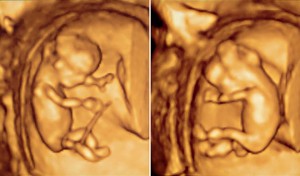Genome Sequencing For Fetuses
Can you imagine being able to know more than just the gender of your baby before it is even born? You may soon be able to learn personality and physical traits of your unborn baby!
A discovery in 2012 was made by researchers at the University of Washington when the successful sequencing of a complete fetal genome was made. This sequencing is unlike any previous techniques because it does not pose any risks to the baby. The technique is noninvasive and can create a genome sequence of the developing fetus from as early as the first trimester.

- Fetus. source: flickr.com
Today’s common prenatal genetic tests include amniocentesis and chorionic villus sampling. These tests require a needle inserted into the amniotic sac to test for certain genetic diseases and chromosomal abnormalities. They are invasive and pose a 2% risk of miscarriage.
The newly discovered technique is possible because there is circulating cell-free DNA. A portion of which, in a pregnant woman’s blood, is derived from the fetus. This can be isolated and further sequenced. The test requires a sample of blood from the mother and blood or saliva from the father. Once the parents’ genomes are determined, one can determine which DNA comes from the fetus.
The main benefit is early medical warnings that were previously unknown. Importantly, scientists are interested in identifying conditions that can be treated before birth. Is there a limit though to how much genetic information parents should know?
Not all genetic irregularities are expressed. Whole genome mapping merely predicts the possibility of disease. Consequently, parents could be living in fear or even abort the baby that may never actually have the disease appear.
In just five years time this testing could be clinically available. I think this topic is so interesting and controversial, and the future debates on this topic will be fascinating.
By Ashley Dolman


One response to “A Top Scientific Discovery: Would You Want To Know Your Baby’s Genetics?”